|
|
| |
Film
The Dark Knight analysed 37 ITP Mission Istaanbul reviewed 40
'Laga Reh' gives Pakistani pop a much needed rebel yell
Shehzad Roy's album Qismat Apne Haat Mein is even better
Shehzad Roy outdoes himself with his new effort and breaks new conceptual
ground in Pakistani pop
By Muniba Kamal
|
| |
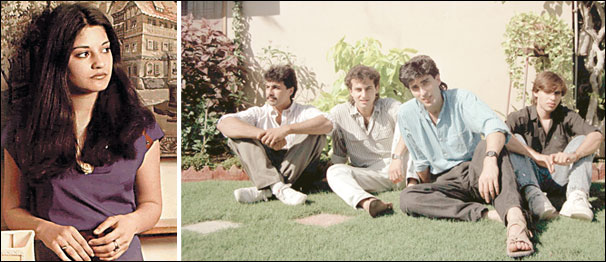 |
| |
The
video grabbed the attention of the nation as soon as it hit the airwaves.
And within a week of its release, 'Laga Reh' was playing and replaying
at an ad nauseum rate, except we never got nauseated… it remains
a song that speaks for all of us.
After countless viewings, I still find myself laughing at it. The
bunglings of the government in the newspaper makes the giggles gurgle
up twofold. At a time when things are being painted as badly as they
are in the press, the cat and mouse game between the political parties
and the ex-General with both playing Tom and Jerry alternately, our
PM's visits abroad and the hysteria they generated here at home, American
transgression on our soil, various Rehman Malik fiascos, lawyers on
a rampage, the perpetual breaking news situations on all or news channels
that are bordering on the ridiculous now because the crises have gone
on so damn long that they seem to have become a bad joke.
In the 'Laga Reh' video, Shehzad Roy takes this bad joke and turns
it into a great video, internalizing the experience so we all identify
with it.
“Main jab dus saal ka tha tou mein ne nine o'clock news pe suna
ke Pakistan tareekh kay aik nazuk mor se guzar raha hai.” (When
I was ten so I heard on the nine o'clock that Pakistan is at the crossroads
of history). And then after one guitar riff, when he turns twenty,
he hears the same on the 9 o'clock news. It's been the story of our
lives and Ahsan Rahim's video is the perfect vehicle to carry the
most topical song a Pakistani pop artist has ever come out with. With
cameo appearances by Ali Azmat as the common man, Mani as a broadcast
journalist talking about how the situation is under control at a riot
gets hit with a stone to the back of the head and most unforgettably
Faisal Qureshi, a dehati on a charpoy who witnesses Shehzad being
dragged off by foreign troops and goes right back to sleep, ‘Laga
Reh’ is a song that weaves together skits to come up with the
most gloriously pertinent one liners.
“Mujhe fikar yeh nahin key eh mulk kaise chale ga, mujhe firk
yeh hai ke aisay he na chalta rahe.” (I'm not worried about
how this country will run, I am only worried that it will carry on
running like this)
The song incorporates hilarious dialogue between Shezad and a buzurg
(elderly gentleman):
Shehzad: “Mulk mein kitni tension ho gayi hai” (Look at
the tension in the country)
Buzurg: “Kuch nahin kuch nahin, sab Allah par chhor do”
(It's nothing, just leave it to God)
Shehzad: “Kuch na kar kuch na kar too sab kuch allah par chhod
do… Allah hi tera hafiz hai” (Don't do anything at all,
leave it all to God and then only God will be your saviour)
It's edgy stuff and incredibly relevant. This is the way previous
generations have thought; indeed, the lines Shehzad Roy has penned
are something said to us by some buzurg at some point in time or another.
A whole new generation that has grown up with that attitude does want
to go out there and change the status quo. It is this generation that
Roy is choosing to identify with. |
| |
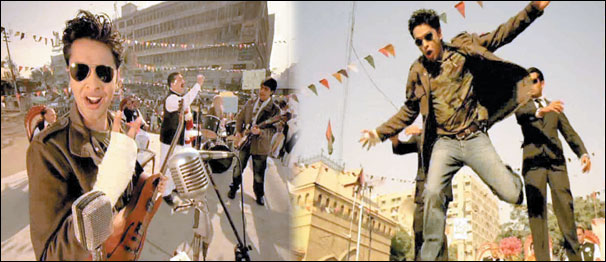 |
| |
And
the video ends with perhaps one of the most classic lines one has
ever heard.
A punter to a politician: “Sir, lagta hai qaum ko jaganay ka
waqt aa gaya hai.” (Sir, I think it is time to wake up the nation)
Politician: Qaum ko mat jagao, yeh kisi zaroori kaam se so rahe hain!
(Don't wake up the nation, they're sleeping because of some important
work)
‘Laga Reh’ is indeed the funniest take on life in Pakistan
today and has people of all ages rolling with laughter and has made
Shehzad Roy a superstar. People who didn't think much of him before,
now agree he is an icon. How much difference the right idea at the
right time can make to a career! And having the right connections
and good synergy with them go a long way in helping one execute what
one wants to.
‘Laga Reh’ is probably director Ahsan Rahim's finest video
and it looks very much like a collaborative affort. Ahsan and Shehzad
go back a long way. As do Ahsan, Faisal Qureshi and Mani having worked
on Ulta Seedha together. With perhaps the most cinematic eye in the
industry, Ahsan outdoes all his previous work with the video and the
way the visuals sync with the song makes one think they were conceived
together. The song and the video speak of major brainstorming and
some very creative minds working together. That Shehzad Roy has built
bridges between all these talents is commendable. It shows a man capable
of recognizing talent in the industry and bringing them all together
to create a video that truly exploded into our consciousness.
And the biggest surprise is that when you give the album a listen,
you realize that 'Laga Reh' is not even the best song on it!
Qismat Apne Haat Mein
‘Laga Reh’ is the second best song, but it employs a clever
technique that Shehzad uses to devastating affect in the title track
of his album, which is characters speaking out and leading in to his
music. The best song by far is 'Qismat Apne Haat Mein' itself.
It begins with the extremely affected accent of a London returned
Pakistani girl who says: “Mein mulk se bahar parhne jaana chahti
hoon, taa ke wapas aake gharib logon ki, you know jo gharib hote hain?,
you know jo thore se woh hote hain, you know gharib se? You know what
I mean? Unn ki madad karna chahti hoon.” (I want to go abroad
so I can come back and help poor people, you know people who are like,
you know, poor? You know what I mean? I want to help them)
Shehzad Roy: Cough Cough…
London returned girl: What happened?
Shehzad Roy: I'm allergic to bullshit.
And then the guitar riffs start and leads into a rollicking number
laden with clever innuendos.
Zulm na kar too varna chhor dein ge yeh galiyan
Chand logon ne qaum ki lay lee hai (meaningful pause)
Qismat apnay haath mein.
(Do be cruel or we will leave these streets. A few people have taken
the fortune of Pakistan in their hand)
Unfortunately the clever innuendo that makes one laugh out loud gets
totally lost in the English translation. |
| |
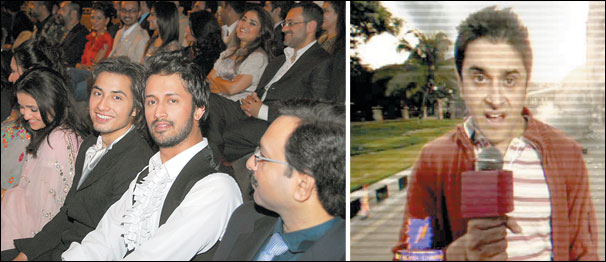 |
| |
‘Qismat
Apne Haat Mein’ is a gem of a number, calling on the youth to
wake up and smell the coffee and realize what is happening around
them. That said, the album is not ground breaking musically, which
is one criticism seasoned musicians have set forth. But one must say
to them that the album breaks new ground in terms of the thought that
has gone into it. It shows a singer chronicling what is happening
in this day and age through song, oodles of angst and a biting wit.
The music is simple, all catchy rhythm and very awami, which is the
way Shehzad has always done it; however, songs like 'Laga Reh' and
'Qismat Apne Haat Mein' stand out for their audacity. And audacity
is exactly what the Pakistani pop music has been missing for a very
long time, ever since Junoon's 'Ehtesaab' was banned... and 'Ehtesaab'
was nowhere close to the anthems Shehzad Roy has come out with.
Songs for the young
There is the excellent 'Khul Ke Pyaar Hum Nahin Kar Sakte' (We cannot
love freely) which goes on: Khul Ke Jhoom Bhi Nahi Hum Sakte
Saara saara din in hi sochon mein gum
Kya ho plan raat ka jis mein ho jaein gum
(We cannot dance openly either
All day we are lost in the thought
Of cooking up an evening plan in which to get lost)
And then Shehzad Roy introduces the father by singing “Raat
hotay hi eik paigham aata hai” (And when it's night a message
arrives)
Father: Beta, barah baj gaye hain, ghar wapas aa jao (Son, it's 12
o'clock, come home NOW!)
This is the story of so many Pakistani teenaged lives and this is
precisely the stuff pop anthems are made of. And these anthems would
not have happened had Shehzad not decided to write them himself. The
lyrical simplicity is what grabs you. Shehzad has taken his own dilemmas
growing up, drawing room conversations, prevailing social attitudes
and spun songs around them in a way no one has before, with the possible
exception of Abrar, who does the same brilliantly in Punjabi. However,
his songs are more social commentary. Shehzad Roy's album has both
the social and political edge.
There is also touch of idealism with the excellent 'Quaid e Azam',
the most unlikely tribute to the father of the nation. It begins with
a child doubting his future because he's been naughty and his grandmother
has scolded him saying he will amount to nothing. And it is this child
that Shehzad sings to. |
| |
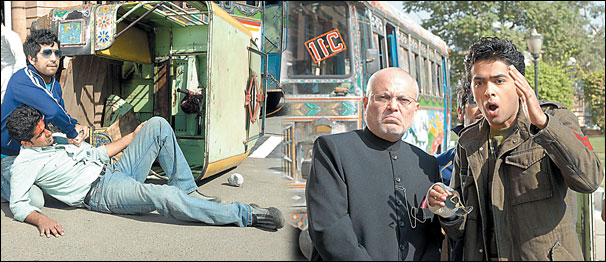 |
| |
Quaid
e Azam jab chhote the, woh bhi nani se shrasrat karte hon ge
Lekin kehte honge: “Mein ek din kuch banoon ga, nanoon ji aap
bhi yaad karein ge”
(When the Quaid was a little boy, he probably played pranks on his
grandma too. But he must have said: “I will be something one
day, someone so big Grandma that you will remember me.”)
It's a song that forces us to think back to childhood, and ponder
on what Jinnah's would have been. And when you look at the song in
context of the man that really was (if you read Stanley Wolpert's
Jinnah) and compare it to what he has been twisted into by our own
skewed perspective of history, Shehzad's imaginings on his childhood
make one say “Good on you Shehzad!”
The other numbers
The other lovely number is 'Zindagi' that was released as a video
last year with Abida Parveen. Abida's voice and the guitar make more
a memorable song. And then there are the ballads out of which 'Aankhein'
remains the most effective because of the edge. “Sapna mera
aankhon se kuch aise gira, saath hi mujh ko bhi le gira”. That
it follows the angsty 'Laga Reh' on the album makes the song even
more poignant.
'Ek Baar', 'Janay Kahan' and 'Darwaza' are sweet enough melodically,
but they aren't a patch on Atif's 'Pehli Nazar' which to date is remains
the catchiest pop ballad of the year. Neither do they have the musical
sophistication of Strings' 'Koi Aanay Wala Hai' and 'Humsafar'. Shehzad
seems to have found his niche on this album, which is edgy pop and
that is something that hasn't been done before. With Qismat Apnay
Haat Mein, Shehzad Roy has moved on from being a pop poster boy to
pop renegade and that is a gigantic leap.
The new Shehzad Roy
Minus the ineffective ballads, Qismat Apnay Haat Mein is nothing short
of a pop revolution. We have seen the bubblegum disco beats Nazia
and Zoheb, and the patriotism and introspection of the Vital Signs.
There has been Hadiqa with her heavily Punjabi influenced pop that
made her a star and one has seen the joyful tongue-in-cheek verve
of Ali Zafar’s Huqa Paani and the meteoric rise of Atif Aslam
who came out with the rather banal Meri Kahani this year. Shehzad
himself was first the 'Teri Soorat' boy and then (a tad more impressively)
the 'Saali' guy… but let's face it, while 'Saali' may have caused
some strong reactions and was a catchy enough song, it was innocuous
and silly. 'Laga Reh' has become a rebel yell for our times and if
Shahzad's next video is 'Qismat Apnay Haath Mein', then he will solidify
that reputation and go down a pop hero. |
| |
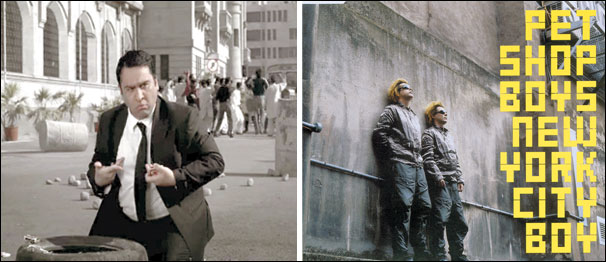 |
| |
It's
about time Pakistan had a pop renegade. Shehzad's edgier songs and
the unmissable 'Laga Reh' phenomenon make him Pakistan's equivalent
of the Pet Shop Boys in London of the '80s. While Duran Duran capitalized
the market on sexy glamour and Wham were out doing fun songs like
'Wake Me Up', Pet Shop Boys had the edge with songs like 'It's a Sin'
and 'Surburbia' that reflected their life and the times they lived
in. Most of all these songs reflected a generation gap.
And for those of us, growing up as teenagers in Karachi, the lyrics
of 'It's a Sin' resonated as we heard the song on TDK tapes bought
from Graffiti in 1987 soon after it was released in England.
At school they taught me how to be
So pure in thought and word and deed
They didn't quite succeed
For everything I long to do
No matter when or where or who
Has one thing in common, too
It's a, it's a, it's a, it's a sin
Everything I've ever done
Everything I ever do
Every place I've ever been
Everywhere I'm going to
It's a sin
The Pet Shop Boys may not have made it as big as Wham and Madonna
would, but they had an impact. And all these years later, they remain
a personal favourite from that era.
They made us think even as they made us dance and sing along with
them. That is what Shehzad Roy has achieved the same in the Urdu slang
idiom with ‘Laga Reh’, ‘Qismat Apnay Haat Mein’
and ‘Khul Kay Pyar’. And that is historical for Pakistani
pop.
The corporate question mark
Apart from breaking new ground in terms of giving Pakistani pop socially
relevant anthems, the other thing that sets Shehzad Roy's Qismat Apne
Haat Mein apart is the fact that it is the only album to come out
this year without a corporate sponsorship. This is shocking considering
that he is tried and tested and in a day and age that even Zeb and
Haniya with their eclectic blend of jazz, blues and Urdu find a corporate
sponsor, the fact that Shehzad Roy didn't makes one circumspect about
the role of corporations in our music scene.
Our pop industry has become heavily dependent on corporate giants
to fund the music scene. In the absence of ticketed events, corporations
organize concerts. In the absence of record labels they started sponsoring
artists and they carry on doing so to this day, be it in terms of
videos or albums. The problem with corporations is that they play
it safe, whereas art is all about taking risks. Will getting that
corporate sponsor keep musicians from coming out with social commentary
and politically loaded songs? Will corporations discourage our artists
from pushing the envelope?
Shehzad couldn't find a sponsor for his album. He told Instep no corporation
was willing to touch it with a barge pole. He went to Fire Records
and Geo and they agreed to do it, which is probably why, the ‘Laga
Reh’ video is subtly branded with the organization's emblems.
It is important though that there is an alternative to the corporate
giants of the consumer good world. Media organizations are willing
to push the envelope in Pakistan and artists should say what they
have to say knowing that someone will back them.
Here's hoping that the refreshing direction of Qismat Apnay Haat Mein
sets the winds of change blowing in Pakistani pop just as the Pet
Shop Boys boys did with British pop in the 80s. There is no reason
why pop shouldn't start ideas churning in your head even as its beat
sets your feet tapping. In fact, it is a winning combination and ‘Laga
Reh's success proves that Pakistan is more than ready for it. |
|
|

